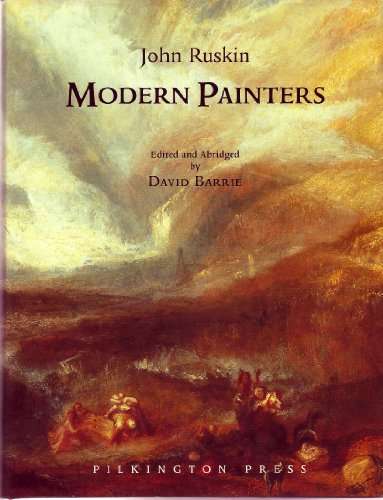
Modern Painters - John Ruskin
Check my rate
| Main centres: | 1-3 business days |
| Regional areas: | 3-4 business days |
| Remote areas: | 3-5 business days |

| Main centres: | 1-3 business days |
| Regional areas: | 3-4 business days |
| Remote areas: | 3-5 business days |
Published by Pilkington Press, London, 2000, hardcover, illustrated, index, 598 pages, 22.5 cms x 28.2 cms x 5.3 cms, condition: as new.
Abridged reprint of the complete edition (five volumes) of 1873.Ruskin, the Victorian-era British art critic wrote Modern Painters in five separate volumes published between 1843 and 1860. It is, among other things, an evaluation of individual painters, a religious statement, a discourse on nature, and a splendid example of Victorian prose style. The original text has been abridged into this one-volume edition, which preserves the essential points of Ruskin's argument and provides the modern reader with a satisfying sample of Ruskin's justly acclaimed prose.
For general collections and research and academic collections in art, history, and literature.A large coffee table book.
John Ruskin (1819 1900) was a writer, philosopher, art historian, art critic and polymath of the Victorian era. Ruskin was heavily engaged by the work of Viollet-le-Duc which he taught to all his pupils including William Morris, notably Viollet-le-Duc's Dictionary, which he considered as "the only book of any value on architecture". Ruskin's writing styles and literary forms were equally varied. He wrote essays and treatises, poetry and lectures, travel guides and manuals, letters and even a fairy tale. He also made detailed sketches and paintings of rocks, plants, birds, landscapes, architectural structures and ornamentation. The elaborate style that characterised his earliest writing on art gave way in time to plainer language designed to communicate his ideas more effectively. In all of his writing, he emphasised the connections between nature, art and society.
Ruskin was hugely influential in the latter half of the 19th century and up to the First World War. After a period of relative decline, his reputation has steadily improved since the 1960s with the publication of numerous academic studies of his work. Today, his ideas and concerns are widely recognised as having anticipated interest in environmentalism, sustainability and craft.
Ruskin first came to widespread attention with the first volume of Modern Painters (1843), an extended essay in defence of the work of J. M. W. Turner in which he argued that the principal role of the artist is "truth to nature". From the 1850s, he championed the Pre-Raphaelites, who were influenced by his ideas. In 1869, Ruskin became the first Slade Professor of Fine Art at the University of Oxford, where he established the Ruskin School of Drawing. In 1871, he began his monthly "letters to the workmen and labourers of Great Britain", published under the title Fors Clavigera (18711884). In the course of this complex and deeply personal work, he developed the principles underlying his ideal society.